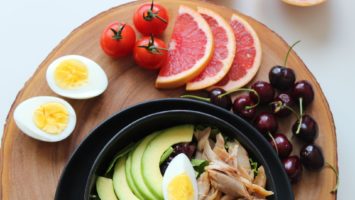
Body Recomposition Diet
In this article, I will discuss how to create a body recomposition diet. If you want to lose body fat while gaining lean muscle mass, you need to make specific changes to your nutrition plan.
What is Body Recomposition?
Body recomposition refers to a change in your body composition where you simultaneously build muscle while losing fat. While beginners and people with a high body fat percentage may have an easier time achieving body recomposition, even advanced exercisers can continue to build muscle while losing fat. For more background information on body recomposition, you can read my articles Body Recomposition: Build Muscle While Losing Fat and Why You Should Pursue Body Recomposition.
Calorie Needs
Beginner lifters and people with a high body fat percentage can usually build muscle and lose fat even despite a calorie deficit. These people can eat fewer calories than they need to sustain their weight. If you just started lifting weights or carry a lot of body fat, you can drop your calorie intake by 300-500 calories per day and still build muscle mass.
Intermediate and advanced lifters should try to eat close to their maintenance calories, or at a slight calorie deficit. Consume close to your daily maintenance calorie levels, or just 100-250 calories shy of your maintenance levels.
While determining your unique calorie needs is beyond the scope of this article, you can read my article How Many Calories Should I Eat? for more specific guidance.
Protein Intake
High protein intakes allow you to build and retain more muscle mass than low protein diets. To help you build muscle while losing fat, aim for 1.2-1.7 grams of protein per kilogram body weight per day. You should aim to break up your protein intake into three or four doses per day. Some good food choices to help you reach your daily protein goals include chicken breast, Greek yogurt, lean beef, turkey, fish and protein powders. Aim for 30-40 grams of protein per meal.
Fat Intake
High quality fats can also help you improve your body composition. Fat is an essential nutrient and should comprise 20-35 percent of your daily diet. If you consume about 2000 calories per day, you can include approximately 55 and 75 grams of fat daily. Aim for mostly plant based sources of fat like avocados, nuts, seeds and plant based oils. You can also include fats that occur in animal products naturally.
Carbohydrate Intake
Carbohydrates can comprise the rest of your daily energy intake. You can aim to include roughly 40-65 percent of your daily calories from carbohydrates. After you have divided up your daily protein and fat intake, carbohydrates can comprise the rest of your diet. You want to include mostly whole carbohydrate sources like potatoes, sweet potatoes, fruits, whole grain oats, rice and bulgur.
Make sure to include easy-to-digest carbohydrates before and after workouts. 25-50 grams of carbohydrates an hour or two prior to your workout can boost strength, power and stamina. You can also include 25-50 grams of carbs post workout to improve recovery. Try to consume a post workout meal in the first few hours after your workout.
Meal Frequency
Your meal frequency for body recomposition should follow your daily needs and schedule preference. Try to consume two to five meals per day. Instead of following a rigid schedule, find an eating frequency that works for you and your lifestyle.
Meal Timing
Your meal timing should also follow your daily schedule and preferences. Ideally, you should eat a meal prior to workouts and in the three hour window after your workouts. Outside of workout times, you should aim to eat every 4-5 hours (at least) to maximize muscle growth. Outside of these rules, try to find a schedule that accommodates your lifestyle and hunger.
Closing Thoughts
Following a few good nutrition principles can help you maximize your body recomposition phase. While you don’t need to follow a simple rigid meal plan, consuming adequate calories and nutrients and paying attention to your nutrition around your workouts can help you build muscle while you lose fat.